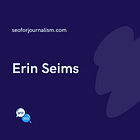Five soft skills every news SEO needs to master
Why adaptability, communication, news judgment, people-first thinking and decision making are essentials for news SEO — plus tips to build each skill
Please help us get the totes out of Jessie’s house! Please!
Show your support for WTF is SEO? in the wild. Get one of our limited edition branded totes.
Hello, and welcome back. Shelby here, back from a wonderful summer weekend. There is nothing better than a pool party during the day, bowling and ice cream at night and still getting nine hours of sleep. I think I may have found the secret to happiness.
This week: Five must-have soft skills for anyone working in news SEO. We cover why each one matters, why it's important and tips for developing the traits.
This list is not exhaustive! Tell us what we missed or your favourite skill — and how to hone it — on Slack.

Let’s get it.
In this issue:
What are soft skills and why do they matter in news SEO?
Five soft skills to develop as a news SEO
THE 101
What are soft skills and why do they matter in news SEO?
News SEO is a people-first discipline. So, when looking at skills that make a news SEO editor stand out, a lot of them are people-first. Soft skills are people-related traits that help you collaborate effectively with others to achieve a goal. They're non-technical and reflect how you contribute beyond a specific trained capability. It's all about your ability to get things done in a positive way.
As audience editors, we often hone in technical or product SEO skills, or focus on something like learning to code. But, a lot of the job is working with other people to move ideas forward and achieve long-term success. Soft skills make that possible.
Building soft skills starts with self-awareness. Feedback is a crucial part of progress and development. Feedback is not criticism — when delivered correctly. It’s an opportunity to reflect on your own strengths and weaknesses, and be one per cent better every day.
THE HOW TO
Five soft skills to develop as a news SEO
Below is a non-exhaustive list of must-have soft skills. These have been crucial to my success in the industry, and will help you become indispensable in the newsroom.
Adaptability
What is it? In SEO, the only constant is change. Adaptability is the ability to handle this change, adjust and be flexible with moving priorities. Every day in news SEO is different; you might be asked to work on stories outside your comfort zone, or explain a new feature to the C-suite. Being adaptable means responding effectively to these changing demands.
How to build it: Embrace change, don’t fight it. This is very much a mindset adjustment. It’s easy to be frustrated, but approach change as an opportunity to be part of the solution. Learn about the why behind the change versus the what; there’s always a reason (even if it’s not clear to you).
Ask yourself — and your manager or colleagues — how you can adapt to the “new world.” Position yourself as someone who champions change and help others.
News judgment
What is it? News judgment is the ability to determine whether something is worth covering. Every organization defines newsworthiness differently, but understanding what makes something significant to a publication is a key skill to have, especially in chaotic moments.
How to build it: Read a lot of journalism from a variety of publications and sources. Analyze Google Trends’ “trending now” list for what people are searching for and how outlets are writing about those topics. Review pitches that are successful. Ask for feedback on rejected pitches to better understand what is “on brand” for your outlet. And keep pitching. It’s the best way to learn.
Communication
What is it? Communication is a coveted soft skill, especially in a mostly-remote world. Communication is about how you effectively convey information, regardless of the medium. Your words — and actions — matter. They especially matter when it comes to text, where tone can be easily misunderstood or misinterpreted.
Communication is also non-verbal. A person’s energy can vary in-person and virtually on calls. Someone may react to something said in a non-verbal way. Understanding that can be hugely beneficial. Picking up on cues can aid in reframing the message or take a moment to clarify, versus assuming they reject the idea and cause conflict. .
How to build it: Over-communicate. Detail every task, and ask for clarification and feedback at all stages of a project.
Courses and tests like the DiSC scale can be really helpful to not only understand how you like to communicate, but also how your colleagues work effectively. This makes you more valuable in the workplace.
Finally, always ask for feedback for how your words are interpreted in meetings and messages. Ask a colleague if your point came across effectively, or how to do it better next time. Never be afraid to have a colleague or more senior editor review an important message, especially if there’s a chance for conflict.
Customer service mentality (aka empathy, patience and understanding)
What is it? Claudio Cabrera preaches the importance of having a good customer service mentality because that’s what we are as audience editors. We put customer service first: providing support for the newsroom and directing them in a way that reflects the goals of the company. You must be patient as individuals learn new systems, understand the hesitancy or pushback (and not take it personally) and be compassionate as folks embrace change.
How to build it: Firstly, it’s about understanding that everyone has their own responsibilities. Your asks — at first — may feel like a burden to other editors. Set up 1:1s with people you work with closely to learn about their workload, daily responsibilities and pain points. The goal is to see where you can help with challenges or roadblocks.
Decision making
What is it? Good decision makers know that time is of the essence. It’s important to make decisions that you’re confident in, and make them fast — especially in journalism. Successful news SEOs make decisions quickly, backed up with data and solid news judgement.
How to build it: Start by adding a bit of urgency to every decision you need to make. This will force you to trust your instincts rather than be influenced by external factors. When you make a decision that results in a positive outcome, document it for future reference. When a decision results in a negative or unwanted outcome, learn from it. Failure is redirection. Ask for feedback from your manager or colleagues involved in the process.
Impostor syndrome can heavily affect your ability to make confident decisions. Remember that you were hired for a reason. You know what you’re doing. Direct the ship in the way you want to go, but remember that people will support you, too.
The bottom line: Soft skills make up so much of a successful news SEO. Work on developing your soft traits by asking for feedback, listening and talking to your colleagues and refining your communication tactics. Is there something we missed that you think is necessary? Email us, or mention it on our Slack!
#SPONSORED - The Classifieds
Get your company in front of more than 13,000 writers, editors and digital marketers working in news and publishing. Sponsor the WTF is SEO? newsletter!
RECOMMENDED READING
Google news and updates
🤖 Google: AI Mode in Google Search is rolling out in India.
🤖 Barry Schwartz: Google’s June 2025 core update is leading to some partial HCU recoveries (and is still rolling out).
Even more recommended reading
🔬 Aleyda Solis: Shopify is listed along with Bing as a ChatGPT third-party search provider.
📷 Luis Rijo: Instagram content became searchable on Google as of July 10.
🥷 Roger Montti: OpenAI and Perplexity are set to battle Google for browser dominance.
📈 Greg Jarboe: Is web traffic a vanity metric? Not if you’re a publisher.
💩 Nick Leroy: The SEO loser mindset, part 2: No, Google doesn’t owe you nothing. I’ll tell you why.
👋 Alexis Rylko: SearchGPT (quietly) abandons Bing and moves to Google, a study found.
⚓ Kevin Indig: Here’s how you can track brand authority for AI Search.
💡 Josh Blyskal: Here are three search insights in one day from analyzing 19 million citations from Google’s AI Mode.
What did you think of this week's newsletter?
(Click to leave feedback.)
Catch up: Last week’s newsletter
Have something you’d like us to discuss? Send us a note on Twitter (Jessie or Shelby) or to our email: seoforjournalism@gmail.com.
Written by Jessie Willms and Shelby Blackley







